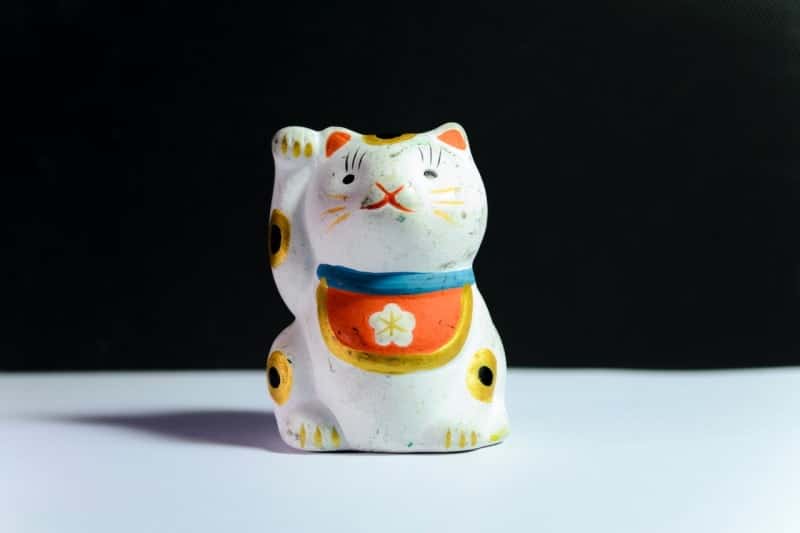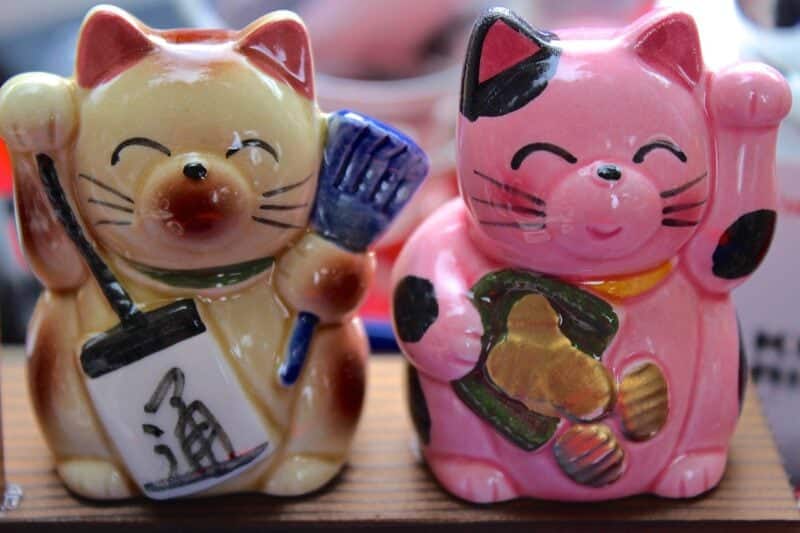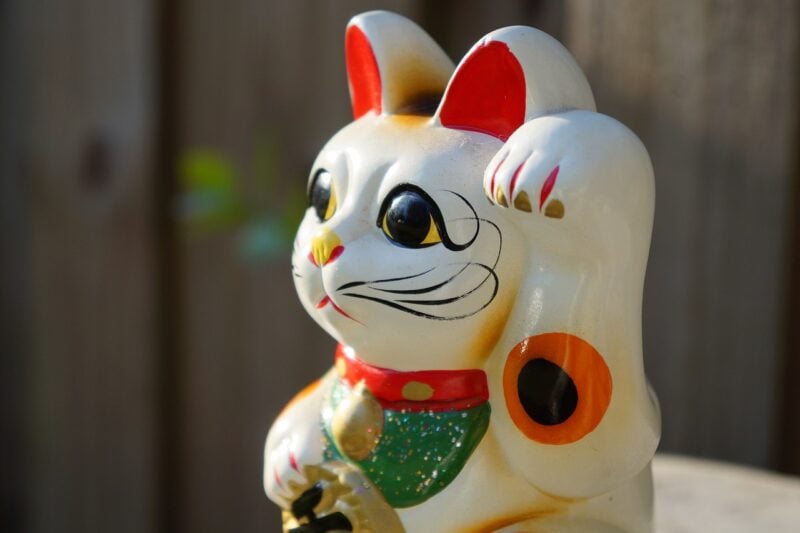The last time you went to a Chinese restaurant, you probably noticed at least one of those waving cat statues near the front of the building. Since the waving cats are so ubiquitous in Chinese restaurants, there’s a good chance you’ve always thought the statues were Chinese.
However, the waving cat, known as maneki-neko, is Japanese! Now that you know where this waving cat is from, you might be curious to learn more. That’s why we’re here with a quick history of the Japanese waving lucky cat and why it’s considered lucky.
The History of Maneki-Neko
The first thing to know about the waving cat is that it isn’t waving. Instead, it’s beckoning. In Japan, when you want to call someone over to you, you raise a hand and do what looks like a one-handed clap. “Maneki-Neko” actually translates to “beckoning cat.”

Origins
Regarding the origins of the maneki-neko, there are several legends, but two stand out more than others. Probably the most common explanation of this statue’s origin is the legend that it came about in the Edo period of Japanese history. The legend tells the story of Ii Naotaka, who was passing by Gōtoku-ji temple when a cat beckoned him into the temple.
As soon as he stepped inside, lightning struck where he had just been. Naotaka was so grateful to the feline for saving his life that he designated it a patron of Gōtoku-ji, and a shrine was created. To this day, you’ll find thousands of beckoning cats at this temple. Then there’s the tale of an older woman in 1852 who was so destitute she could no longer care for her cat and had to give it up.
Her former pet then appeared to her in a dream, saying that if she made dolls in the cat’s image, she would gain good fortune. So, she did. And sure enough, she was able to rise out of poverty due to how popular the dolls became. However, the statues, known as maru-shime no neko (“good fortune cat”), differed slightly from the traditional maneki-neko since they were sideways sitting, with the head facing forward.
The Spread of Maneki-Neko
Like its origins, how the maneki-neko spread outside Japan is also unclear. An anthropology professor from the University of California suggested that the statues may have become widespread due to the Public Morals Ordinance of 1872. Until then, phallic charms were often publicly displayed in Japanese towns.
However, the government of Japan wanted to look more polished to conservative Westerners, so the Public Morals Ordinance outlawed those charms, and the maneki-neko ended up taking their place. The statues then became prosperity amulets, which caused them to spread to other Asian communities, particularly in China.
But how did they get to the States? Japanese pop culture boomed in the 1980s and 90s in what was known as the “Cool Japan” era. Pop culture from Japan was everywhere, and along with a wave of Chinese immigration to America, the maneki-neko became embedded in American culture as well.
The Good Fortune of Maneki-Neko
So why exactly do these beckoning cats represent good fortune? While part of it has to do with the good fortune found in the legends of their origin, there are other reasons, too—mainly how the statues are tied in with their real-life counterparts. Cats have been feared and revered throughout Japanese history.
In the 1600s, they were revered for their excellence at pest control, and then they became well-known as a sign of prosperity for businesses. However, there have also been a host of supernatural felines in Japanese folklore; some were quite monstrous.
This love/hate relationship with felines can be summed up with the Japanese proverb neko wo koroseba nanadai tataru (“If you kill a cat, it will haunt your family for seven generations”)—or essentially, take care of a cat, and it will take care of you in turn.

Colors and Accoutrements
One more thing to know about Maneki-Neko is that these cats come in several different colors (and not for aesthetic purposes!). You can find the beckoning cat statues in colors including:
- White (brings happiness)
- Red (brings health)
- Gold/yellow (brings good fortune)
- Black (protects against omens and illness)
- Pink (brings love)
- Silver (brings longevity)
Colors aren’t the only features that change the meaning of these statues, however. Sometimes, the felines come with accouterments as well, such as:
- Gold bells (brings good fortune)
- Red scarfs (attracts attention)
- Gold coins (brings wealth)
The paw the cat is beckoning with changes the meaning, too; the left paw beckoning indicates customers and friendship, while the right paw indicates good fortune.
Final Thoughts
The waving cats in Chinese or Asian fusion restaurants are neither Chinese nor waving. Instead, the beckoning cats came to us from Japan (although primarily via Chinese immigration). The statues can be amulets and talismans and have several purposes, from bringing good fortune to bringing love, depending on their color and accouterments. Even which paw they’re beckoning with brings a different meaning.
You might want to add a maneki-neko to your home to invite good fortune and health!
Featured Image Credit By: angelsover, Pixabay












